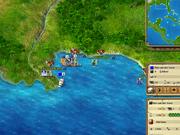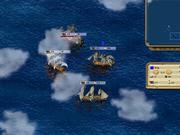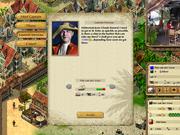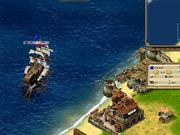Ascaron's strategy game Port Royale takes place in one of the most exciting seagoing settings for a game: the pirate-infested Caribbean of the 16th and 17th centuries. At the time, huge Spanish galleons loaded with gold carried enough cannons to keep ordinary pirates at bay, but there were still plenty of less-defended trade ships that were easy prey for dastardly pirates and buccaneers looking to amass a quick fortune. Intermittent wars between colonial nations made this frontier even wilder--well-armed traders would often be pressed into duty as privateers with a license to sink or capture enemy ships. Port Royale sets you loose in the middle of this world to make your way as a trader, privateer, pirate, or some combination of the three. Once you get past Port Royale's steep learning curve, you may find yourself enthralled by the game's promise of profiteering and pirating on the high seas.

Those who played MicroProse's classic game Pirates! will find many of the same basic elements in Port Royale, including real-time ship-to-ship combat, career advancement, treasure maps, and story-based missions involving the search for lost family members. But developer Ascaron's prior work on Patrician II--the 2001 strategy game based on medieval Hanseatic League sea trade--is reflected in Port Royale's sophisticated trading system, and the new game has a similarly dry, detail-oriented style. Still, the game is much better than Patrician II, not only because of its more refined interface and graphics but also simply because there's now plenty to do when you're not in the mood to design the best sea routes for buying low and selling high.
It can be surprisingly difficult to get started as a rookie pirate or trader in a normal game of Port Royale, but fortunately the game features a tutorial that provides a detailed walk-through of the game's basic elements. There are no variable difficulty settings for the overall game, but the normal game mode does present you with a handful of custom settings that shape the way your career will unfold. The first step is to represent one of four nations--Spain, England, France, or Holland--which will determine your hometown and initial reputation among the major powers. The time period option (available in 30-year increments, from 1570 to 1660) determines what the map will look like; in earlier periods, the Spanish will control more colonies than they will in later periods. Finally, you can adjust a series of options that will make you slightly better suited for pirating or for trading.
Once you've made those decisions, you're ready to start adventuring, though you'll begin with only a single, defenseless ship with an empty hold and a stack of gold coins. With such lowly beginnings, your weekly expenses are minimal, so it's possible to sit around in port to buy and sell as prices dynamically rise and dip or to build a basic business like a tobacco, sugar, or cocoa plantation. But the real way to make your way in the world is to fill the ship up with cannons or with goods and get to sea.

Hunting the high seas isn't easy, but it can be rewarding. Port Royale features an interesting and simple real-time combat system that lets you capture and commandeer enemy ships, and, by recruiting additional crew members, you'll be able to increase the size of your fleet surprisingly quickly. And pirates aren't just general targets--some infamous pirates have prices on their heads that you can collect if you successfully capture them, and in other cases, you'll be able to ransom captured privateers to their sponsor nations.
You can also turn to hunting the armed merchant ships flying national colors. These ships are much more lucrative prey because of the free goods you can seize from their holds, though attacking a nation-sponsored ship damages your reputation. After a few more attacks, ports will start refusing you entry, and after many more attacks, you may find yourself the target of military convoys. But once you can afford to buy a letter of marque and become a deputized privateer, then every bad deed against an enemy nation is repaid with a corresponding increase in reputation with your own. Though you'll find that many settlements close their doors to infamous pirates, Port Royale does give you the option to attack anyone and everyone. It's even possible to play the game as a lawless, bloodthirsty pirate, especially once you discover a map to the pirate hideout (which you can capture for your own use), but this is a somewhat limited path fraught with many additional challenges.
At times, trading can seem like a painstaking minigame that's separate and distinct from Port Royale's pirating and adventuring elements, but you don't need to get extremely involved in the game's dynamic economy if you don't want to. At its best, the trading game is a constantly engaging way to make heaps of money, and the fact that the towns can grow (or shrink) as a result of their needs being met (or not) both underscores the importance of trade and forces you to adjust business strategies and trade routes with the shifts in supply and demand. Enlarging your convoy with purchased or captured ships means more cargo space. And since Port Royale lets your character gain levels, like a role-playing game, each time your character gains a level (as a result of success in business, missions, or combat), you can hire more convoy captains so that you can eventually operate multiple routes, though this does require more effort.

For what it's worth, the game provides some tools to manage some business tasks automatically, and the trading interface is as clean and clear as you could hope for. For instance, an important step in establishing your business presence is to build storage facilities in other towns. These buildings can buy and sell inventory within very strict guidelines, and if you set these parameters up properly, you can sell products at a good profit simply by dropping off goods from your ships and having your storage facilities sell it all automatically. The game also lets you set up automatic trade routes to specific towns, which can free up your time and attention for other matters, though you'll often want to check these routes for efficiency and any unexpected events. Managing several trade convoys in real time can often require a level of attention that not all players may want to put into the game.
Fortunately, Port Royale offers random and story-based missions as a change of pace from either pirating or trading. At the governor's mansion found in large towns you can find a variety of random missions for profit or an increase in reputation. These missions include simple tasks like taking settlers to an underpopulated town or tracking down a specific pirate. Every town also has an inn, which is a steady source of rather mundane search-and-retrieval missions and of collectible map pieces for the pirate hideout or buried treasure. However, some of the missions are related to a long-running story that involves finding your character's sister, as well as tracking down the pirates that were involved in the deaths of your character's parents. The story is presented simply with a few paragraphs of dense text to read at each step of the way, but it's still rewarding enough the first time through, and the pirate battles that result are big and particularly challenging.
Ship-to-ship combat is an everyday affair in the life of an ambitious privateer. The game's tactical combat may seem simple when compared to the combat in specialized games like the Age of Sail series. However, Port Royale's combat has just enough detail to keep the tactics interesting, and many battles are short enough that they let you get back to the main game in a matter of minutes. You can fire on enemy ships with three types of ammunition--grapeshot, chain shot, and standard cannon balls--to attack different parts of a ship: the hull, crew, or sails. Interesting features like wind direction and speed control help you maneuver your ships into range to fire salvos without getting hit yourself. The unit AI is good for following enemies and aiming cannons, but it's otherwise problematic; your AI-controlled ships will sometimes get in each other's way and collide. The naval AI also has problems when attacking a town's shore batteries, so if you're trying to plunder a town, you'll often find that it's a better idea to assemble a huge crew armed with muskets and try a land-based attack.

The 3D ship battles are the high point of Port Royale's graphics, but the 2D town and world map views are also generally crisp and detailed. And although the game could have benefited from at least some voice work for the combat or story aspects of the game, the sound effects do a good enough job, and though the game's soundtrack is limited, it helps the hours pass unnoticed. Unfortunately, we did run into some occasional stability problems while playing. You may also find some missions to be frustratingly difficult in unexpected ways--sometimes they'll be scripted with unreasonably short time limits or with ships that appear only in special circumstances.
However, if there is an obstacle that prevents you from really enjoying all that Port Royale has to offer, it's the game's learning curve, which you should hopefully be able to get past in the first few hours. Over time, you'll see how the interface works to streamline both naval trading and patrolling the seas with warships. Even though you may find moments of frustration with the game's missions and its challenging economic model, digging deep into Port Royale provides a varied and open-ended experience--along with the simple satisfaction of playing as a pirate.